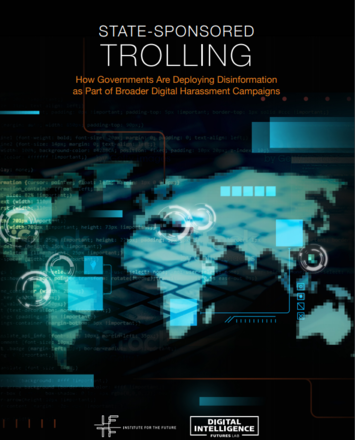
Related contents
Online harassment of journalists: the trolls attackThe Oxygen of Amplification
Common sense wanted. Resilience to “post-truth” and its predictors in the new Media Literacy Index 2018
This digest has been produced in cooperation with the European Federation of Journalists (EFJ)
This report, defined by its authors as “the first comprehensive attempt to describe the phenomenon of state-sponsored trolling from a qualitative and quantitative standpoint”, contains in-depth illustrative examples of state-sponsored trolling in seven countries: the United States, Azerbaijan, Bahrain, Ecuador, the Philippines, Turkey, and Venezuela. This study's primary aim is to describe the phenomenon and propose policy solutions that could constitute an important first step in remedying what is defined as a new form of human rights abuse.
The expression "state sponsored trolling" refers to a phenomenon where a state makes use of targeted online hate and harassment campaigns to intimidate and silence its critics. The "surveillance and hacking possibilities afforded by a new era of pervasive technology" offer governments around the world the possibility to use new digital tactics to persecute perceived opponents at scale. The researchers that worked on this study, starting in late 2015, examined this phenomenon for more than eighteen months.
Their findings suggest that, although state-sponsored trolling occurs in a variety of countries and polities, it is possible to identify common features, especially in the strategies and tactics used to carry out attacks. Media figures subjected to state-sponsored harassment are often those reporting on the use of state-sponsored trolling itself or human rights defenders and activists.
Bots and algorithms are described as fundamental units of the "anatomy of state-sponsored trolling".
Bots serve not only to amplify attacks but also to change their character, making a campaign seem more organic and widespread. Political bots are used by political parties and movements to attack or drown out critics, boost follower numbers, and magnify the messages of political candidates.
On the other hand, trolls increase the prominence and pervasiveness of their messaging by appropriating and gaming the algorithms of social media sites. An example of "appropriation" is given when trolls flag legitimate social media accounts as fake accounts in order to have targets’ accounts temporarily suspended until they can prove their identity. On the other hand, the gaming of algorithms is the deliberate exploitation of a platform’s underlying automated process to achieve an outcome not intended by the platform. For example, one form of algorithm gaming consists in hijacking hashtags in order to drown out legitimate expression.
The deployment of language is also an important element of the above mentioned anatomy. Trolls make use of new technologies while also resorting to well-established messaging tactics. These include: accusations of collusion with foreign intelligence agencies; accusations of treason; use of violent hate speech as a means of overwhelming and intimidating targets; creation of elaborate cartoons and memes.
An interesting element pointed out in the report is that trolls often accuse targets of the very behaviors the state is engaging in. Another important feature is that the infrastructure and mechanisms state-sponsored trolling has grown out of or built upon have been established during election campaigns. The same databases of supporters, committed campaign volunteers, social-media-influencing arms, and dedicated communications channels deployed before the elections are often used after the elections, this time to consolidate or extend power.
The authors see four, often overlapping mechanisms by which governments become responsible for online harassment campaigns:
- State-Executed: Meaning that harassment campaigns against critics and dissenters originate directly from the state apparatus.
- State-Directed or -Coordinated: Governments directing or coordinating, but not executing, state-sponsored trolling attacks.
- State-Incited or -Fueled: The government maintains an arm’s-length distance from the attack, but nevertheless both instigates and profits from it.
- State-Leveraged or -Endorsed: As state-sponsored trolling attacks become a more familiar and commonplace methodology for silencing online dissent, such attacks are becoming seemingly more remote from state institutions. In perhaps the most cynical manipulation of online behaviors, governments point to the existence of seemingly independent groundswells of public opinion to justify and legitimate state positions.
Finally, researchers see three main avenues for formulating effective policy responses to address this phenomenon:
(1) international human rights law
(2) US law
(3) policies of major technology companies.
However, the report finds that new laws are unlikely to stem the practice in the short term, so technology companies have a responsibility to curb state-sponsored trolling now. On this latter point the authors suggest concrete steps to take such as: Detect and identify state-linked accounts; Detect and identify bots; Improve reporting mechanisms and responsiveness.
Tags: Media freedom Freedom of expression Fake news and disinformation Political pressure Social media Legal protection Human rights Censorship Turkey Azerbaijan WorldwideThe content of this article can be used according to the terms of Creative Commons: Attribution-NonCommercial 4.0 International (CC BY-NC 4.0) . To do so use the the wording "this article was originally published on the Resource Centre on Media Freedom in Europe" including a direct active link to the original article page.


